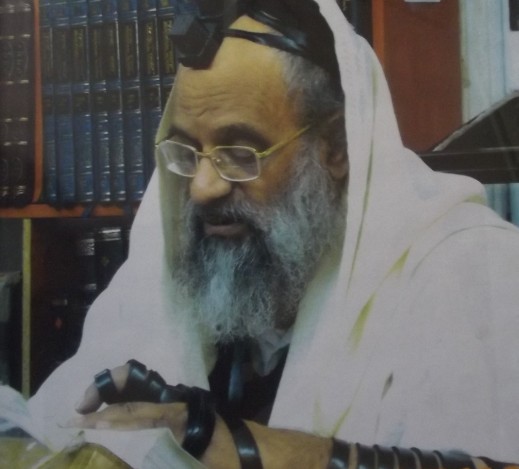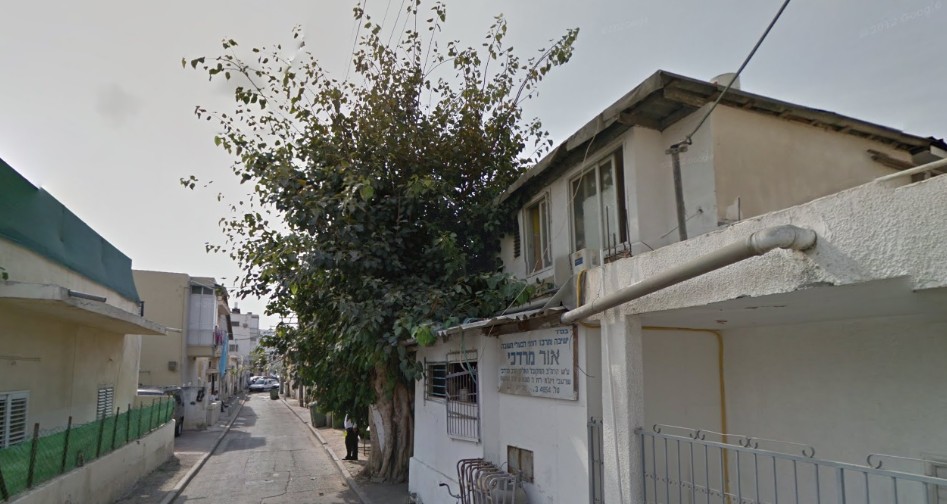Rabbi Efraim Chamami: "Depression? It's Because People Don't Engage in Torah"
The "Or Mordechai" Yeshiva, led by Rabbi Efraim Chamami in Tel Aviv's Tikva neighborhood, has been a focal point for community upliftment for decades. In a special interview, Rabbi Chamami shares the source of his enduring strength and explains why the current generation often struggles with sadness and depression.

In the courtyard of Rabbi Efraim Chamami's "Or Mordechai" Yeshiva in the Tikva neighborhood (9 Huna Alley, near the market, under the big tree), the fridge is open at set times. Anyone in need can come daily to collect groceries: cooked food, milk, bread, poultry, and more. Clothing is also available, or one can enter the Beit Midrash to hear a Torah discourse. "Nothing stays here," says the rabbi. "Donations arrive, and within two hours, everything is distributed. There is movement all day, the fridge is open at set times, a woman organizes the portions, and people simply come and take."
How do you decide to whom to give the food?
"Whoever comes can take. We do not ask any questions of those who come. We do not ask or record anything because giving secretly averts anger, and we do not wish to embarrass the recipient."
The rabbi works extensively with young people here in the Tikva neighborhood and with ba'alei teshuva. How does the rabbi view this younger generation? What is primarily lacking?
"Mainly, a lack of knowledge. This generation lacks a great deal of knowledge and understanding of Judaism and its commandments. We need to explain things to them in a way grounded in reality, not imagination. Connect Torah teachings to life, showing people that mitzvot aren't just actions outside of life's framework—they are life itself. When one is not within this framework of the Torah, they lose their mission in this world, waste time, and suffer doubly. Not only do they not fulfill their purpose, they are headed in the wrong direction."
"Gates of alacrity, that's the motto. To achieve as much as possible, as quickly as possible. Those who do not feel like they are on coals in this world, and do not understand why they wake up every morning. There is no such concept in the world as leisure culture. Every minute must be utilized to exhaustion—either one learns Torah or works. Rest is only after 120 years. Then there will be plenty of time to rest."
 Rabbi Efraim Chamami
Rabbi Efraim Chamami"Those who do not understand life this way, understand nothing. What a person manages to learn and do during their lifetime is theirs, and what they do not accomplish, they lose. The Kaddish said after one passes is only an addition. And the essence of all: Write in large letters—Gates of Alacrity."
The Gates of Alacrity are with the rabbi throughout his journey. Rabbi Chamami, may he live long, grew up in the Tikva neighborhood and studied at "Torat Moshe," then the sole Haredi school in the area. Today, he serves as the head of "Or Mordechai" Yeshiva in the neighborhood, under the presidency of Rabbi Badani, may he live long. Daily lessons and prayers are held at the yeshiva, from the first minyan at five a.m. until evening and night. On Thursdays, there is a midnight program, followed by a Friday program, attracting about thirty young men from across the country, even with organized transport from Bnei Brak."
In addition to distributing food and clothing, the yeshiva hosts Rosh Hashanah seder, Pesach seder, Purim party, holiday evenings, and meals open to all. Furthermore, the rabbi organizes and holds lessons throughout the city, bi-weekly trips to the graves of tzadikim, the Western Wall, or commemorations at subsidized rates (day or night), and leads the conferences of R' Pinchas Reuven in the Tel Aviv area. "We distribute invitations, and even those who don’t attend but know there's a conference, it already affects them."
"Lessons, trips, all the energy, all the tools, all types of populations," he concludes. "I'm talking to you now, and after the conversation, I return to everyone who sought me on the phone. Why? Because to change people's mindset, a lot of advertisement is needed."
The yeshiva's activities are not based on government budgets or consistent funding from any organization. "Everything is supernatural. We receive no budget from anyone, only through divine assistance. We do not have the concept of a fund or accumulated money. We distribute everything, keeping nothing. Because the Creator of the world, who sends money to the Ministry of Religious Affairs to distribute to yeshivot, can send it directly to me. Do not trust in benefactors; Hashem sends what is needed at the right time. No more, like the manna in the desert—a daily portion."
When does the rabbi rest?
The rabbi pauses for a moment. "On the chair. When energy runs out, simply. Every day, at the end of the day, you reach your bed at the end of your strength. But you sleep well."
Young people and ba'alei teshuva face crises and sadness. How do you advise them?
"Sadness stems from physical exhaustion, from the blemish of the covenant. Only Torah brings joy, '*The precepts of Hashem are right, rejoicing the heart*,' and sadness comes from not engaging in Torah. A person needs to engage in Torah or work, and idleness leads to boredom and boredom to madness. This is where all the issues of sadness and depression come from."
"In the previous generation, in the Yemenite community, such a concept of sadness did not exist. Everyone was happy and dancing, even though materially they had nothing, but the simple faith and joy of life cannot be achieved with any material wealth in today's world. They would sing, 'If the doors of benevolence are locked, the doors of the heavens are not locked.'"
"They had strong faith in Hashem accompanied by innocence, and so they attained a joy of life. '*Light is sown for the righteous, and gladness for the upright in heart.*' Whoever is upright in heart is happy."
 The Yeshiva of Rabbi Efraim Chamami in the Tikva neighborhood
The Yeshiva of Rabbi Efraim Chamami in the Tikva neighborhoodWhat is this innocence?
"Innocence is the belief that everything comes from Him, blessed be He, and everything is under providence. What is available is what Hashem has sent. And so ten children ate one shakshuka and were satisfied and happy. And today we have all kinds of salads, all colors, all tastes, and all types, and it's not tasty."
And what is the most important thing for the rabbi to impart to his students?
"The beginning of wisdom, the fear of Hashem. As soon as a person has fear of Heaven, that is the start. Before one begs people to give them a livelihood, a promotion, and complete healing—pray to Hashem, as everything depends on the Creator of the world and our prayer power."
So how do we work on the power of prayer?
"*Wait for Hashem, be strong, and He will strengthen your heart; and wait for Hashem.* When a person feels like they are standing before the Creator of the universe and asks Him like a son to a father, they are strengthened, knowing that Hashem hears them. Remember, a father is not obligated to give a child everything they want, but rather what they need. King Solomon said, if a gentile comes to you, give them what they want. But when a Jew comes, give them only what they truly need."
Student Stories
"The rabbi saved us in this tough neighborhood," says R’ Yitzchak Shachiver, now a Sofer Stam, who grew up in the Tikva neighborhood and studied at the yeshiva 21 years ago. "He taught us Torah and kindness, giving, helping others. He brought a rabbi from Bnei Brak, and we studied with him until nine thirty, ten at night. One of our neighborhood's issues, like in Bat Yam, Holon, is that when young people strengthen themselves, many move to Haredi cities, to Elad or Bnei Brak, and leave the neighborhood. The rabbi strengthens the neighborhood; he has saved many souls here."
"We come here on Thursday nights and gain strength for the entire week," says Mishael Cohen, 20, from Holon. Cohen currently studies in a yeshiva in Bnei Brak and has been studying at the midnight and Friday program in the yeshiva for about two years. "We connect here, studying together for hours, and towards the end of the night, the rabbi gives us ethical talks. Everything here is inspiring. We saw Rabbi Ovadia, the greats; they didn't move from the Gemara. They sat and studied; that's what occupied them. That's how they teach us in the midnight program—that only through this will we elevate ourselves. Only through perseverance."
For details on classes and trips, and to join the SMS mailing list for regular updates, please call or send a message to Rabbi Chamami: 050-7500601

